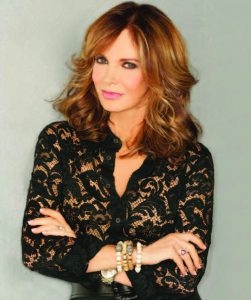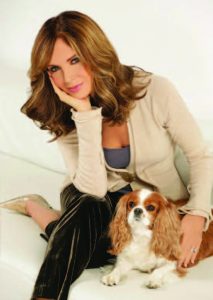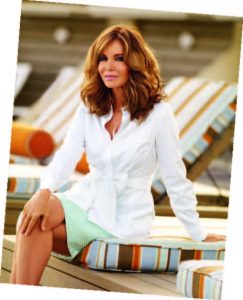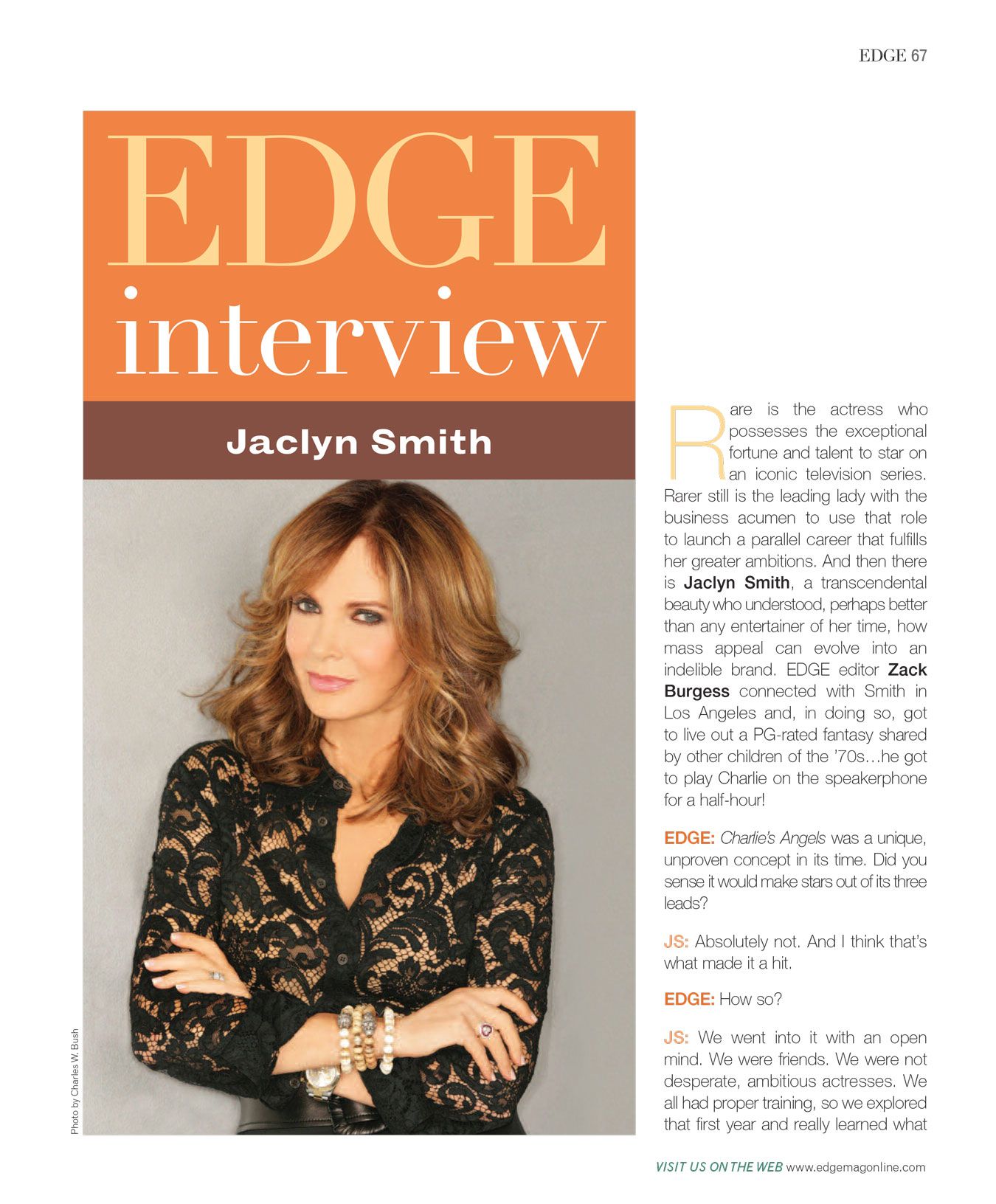
Photo By Chalres W. Bush
Rare is the actress who possesses the exceptional fortune and talent to star on an iconic television series. Rarer still is the leading lady with the business acumen to use that role to launch a parallel career that fulfills her greater ambitions. And then there is Jaclyn Smith, a transcendental beauty who understood, perhaps better than any entertainer of her time, how mass appeal can evolve into an indelible brand. EDGE editor Zack Burgess connected with Smith in Los Angeles and, in doing so, got to live out a PG-rated fantasy shared by other children of the ’70s…he got to play Charlie on the speakerphone for a half-hour!
EDGE: Charlie’s Angels was a unique, unproven concept in its time. Did you sense it would make stars out of its three leads?
JS: Absolutely not. And I think that’s what made it a hit.
EDGE: How so?
JS: We went into it with an open mind. We were friends. We were not desperate, ambitious actresses. We all had proper training, so we explored that first year and really learned what was going to make the show work as time went on. I don’t think any of us thought that it would change our lives. We were surprised—and I think even the producers were shocked—at our ratings. Our ratings went through the roof. We were almost always number one, number two…really up there in the top five. We even beat Gone With the Wind one night!That was kind of amazing—my favorite movie of all time. It was sort of like we were rock stars, only overnight. We had no concept of the impact Charlie’s Angels would have.
EDGE: Did you read for the role of Kelly Garrett initially?
JS: Kelly was initially Kate Jackson’s role, because it was the largest role in the pilot. She was cast from day one; she had already worked with Aaron Spelling. But after reading the script, she liked Sabrina because the description of the character was more of a stretch—the glamour, the clothes, coming from a fine family—but oddly enough, once the show took hold, our own personalities sort of meshed into our own characters. Farrah and I—and later Cheryl (Ladd)—loved clothes. Kate never loved fashion that much, so she chose to stand behind the bar and wear a turtleneck and slacks.
EDGE: Kate was the veteran of the trio in terms of TV work. Did she assume a leadership role that first season?
JS: I think she was the leader that first year. She had done Dark Shadows and then she did The Rookies, so she was just more seasoned. It was nice to have someone who could enlighten us on certain things that we needed to know. But as time went on, we were all equals. That’s what made it work. We just wanted to work together and be cohesive as a team. And that’s really what it was about—three girls on the screen at the same time. That was the concept of the show.
EDGE: Yet critics often took shots at Charlie’s Angels, saying it objectified women. Given the environment of 1970s network television, I think the show was empowering and uplifting.
JS: Yes, it was.
EDGE: Each character also reached a different type of viewer.
JS: There was another strength of the show. We all had our own individual personalities and there was someone for everyone. If someone liked a strong character, they went for Kate. Sexy, Farrah. Me, more of the gentle spirit. Also, we were all—how do I put it?—I think we came off as really caring for each other, which we did. We were friends above all. We were having fun on the screen and I think people found that cohesiveness appealing.
EDGE: Given that cohesiveness, how did you deal with Farrah leaving after the first season?
JS: We said okay, we’ve got to keep it moving. There was a sadness, because we’d had a great first year and we wanted her to stay. However, when you care about someone and they’re not happy, then you have to accept it. I will say that first year was hard to duplicate. But Cheryl came in and filled some impossible shoes. She was amazing. She had such a good attitude and she was great and, again, very appealing. People continued to love the show. I’m very close friends with Cheryl now. I was really fortunate to be on Charlie’s Angels. It reached a very broad demographic and it was one of the first of its kind. It was glamorous, it was fun, and it gave people a period of escapism.
EDGE: What are your thoughts on the movies, and the Charlie’s Angels series that aired in 2011?
JS: The series didn’t work. The two movies did. They were hits. I think there was a darkness to the movies, which wasn’t really our concept. It had nothing to do with the casting, just the subject matter, which was trying to be more contemporary. We were light, we were fun. You know, I did a cameo in the second one and it was really fun. I must admit, I didn’t want to, but Drew (Barrymore) called me and convinced me. We really had fun that day.
EDGE: You ended up taking a lot of TV movie roles after Kelly Garrett. The best remembered might be Jackie Kennedy. Was that the first time you’d played a living public figure?
JS: Yes—and it was frightening! But I loved every minute of it. I had to test for that role, because they said We don’t want an Angel doing Jacqueline’s role, but they liked what they saw. It was a real honor to play her, because I truly admired her. I admired her mostly as a mother. I couldn’t believe the beauty of her. You know, she created Camelot—that was the magic of Jacqueline. I loved playing her, and I loved playing the most beautiful part of life, falling in love with John Kennedy, even though there was heartache.
EDGE: What were some of the unusual challenges that role presented?
JS: Just the fear of not capturing her in the most real way. I’m from Texas and she’s from New England. So you have to drop your R’s. I had a dialect coach, Robert Easton, who stayed with me the whole time. I thought I would just go for the essence—after all, who can be Jacqueline Kennedy?
EDGE: I think of all the merchandising done around Charlie’s Angels and it makes me curious. You’ve established yourself as a successful consumer brand. Is there a connection between the two?

Photo by Charles W. Bush
JS: No, it wasn’t Charlie’s Angels, although Charlie’s Angels made it possible. I was a household name and the people at Kmart thought this is the girl to do a designer line here. They approached me and I had to turn them down, because I was under contract with Max Factor at the time. Max Factor felt that wasn’t my audience, not my customer.
Still, I agreed to take a meeting, and I couldn’t believe the line of clothes I saw in there. It was so beautiful and the price points so affordable. I thought, Wow! My mother had wanted to be a dress designer and I had designed my senior prom dress among other things, and I thought if I could have total input…
EDGE: Meaning…
JS: Meaning everything. Everything from the hangtags to the commercials to where a button goes on a blouse. And they informed me that that’s what they wanted. So I took it on, and it was one of the best decisions I have made in my career—even though a lot of people advised me against it. It’s been 29 years and I’m in homes with sheets and rugs and dishes and glasses, and bathroom accessories. It’s a whole one-stop shop. My apparel is so beautiful today. It’s hard to believe that we can do the things that we do, with the prices that we have.
EDGE: There’s a giving back component to your brand.
JS: There is. Value has always been important to my customer and that’s something I have always wanted to deliver. Not everyone can go and spend a $1,000 on a blouse or an outfit. So I’m really proud. Also, Kmart has made it possible for me to give portions of sales at different times to causes for breast cancer research, because I’m a breast cancer survivor. At Christmastime we always create a little toy and a portion of that always goes to the children at St. Jude Hospital. So they’re very morally conscious, which makes me feel really proud to be a part of this family at Kmart. It’s as much a part of my history as Charlie’s Angels. It really is.
EDGE: How has the Jaclyn Smith brand branched out beyond the Kmart relationship?
JS: I also have a beautiful line of fabrics in fabric stores and with interior designers. The line has been successful because, again, the quality and value is there. They are just very high-end looking. My husband and I—he’s a doctor—also developed a skincare line. If you go to jaclynsmithbeauty.com you can read all about it. I also have a line of wigs. There, again, they’re very affordable. Today, wigs are a fashion statement. But for people who go through chemo, they can get one of my wigs for a very reasonable price. And thinking of them, we’ve used silicone, which is soft and cushiony for people who have lost their hair. It just adheres to your head. You are constantly asking How can we make this better? What can we do to lower price?
EDGE: What’s the difference between Jaclyn Smith the actress and Jaclyn Smith the business person?

Photo by Metthew Rolston
JS: Business is a whole different world as opposed to acting—taking a script and breaking it down, creating a character, I can go into my room and analyze a scene and do it a million different ways. Business is harder. There are certain things in business and branding that just take a team to bring it together and do it right. Everything that I have done in business has been challenging, and I think that’s invigorating to a certain extent because you’re constantly learning something new, constantly rethinking, and reinventing it, going in a direction that you never thought you’d go. As for branding, it’s ongoing. Every day. Going to your desk and figuring out what you are going to do in this collection. I’ve loved it. It’s all under the umbrella of being creative. It’s a wonderful, challenging thing that I am doing today, because I’m giving back to a customer that has been very loyal to me.
EDGE: I have to ask…did you ever get to meet John Forsythe face-to-face?
JS: Oh, yeah (laughs). On the show, though, you’re right, he didn’t come down to the set. I did a movie called The Users with John, so we were friends. But during the run of the show, he made it a point not to come down.
EDGE: With all you’ve experienced in the public eye, what do you ultimately want your legacy to be?
JS: I’m a family girl. The main thing in my life is my family. I’m proud of the work that I have done. I want to be known as a great individual—a person who lived beyond myself, a person who gave back to the world. I want my legacy to be that I have contributed, whether it’s to breast cancer, to children or whether it’s my line of clothes. I want to be known as a person who brought enlightenment to people’s lives, and made their lives a little better, made the day a little easier.





